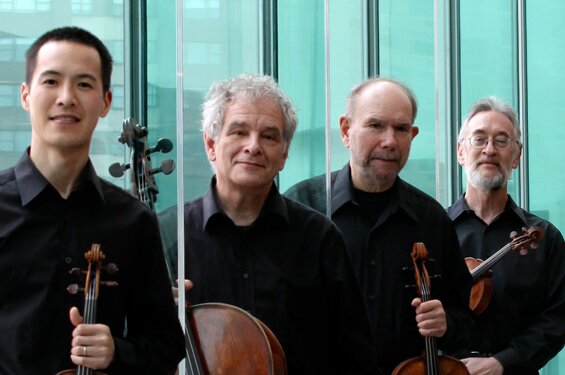It’d be an understatement to call the Juilliard String Quartet a musical institution. Since the ensemble was founded in 1946, the Quartet has produced over a hundred recordings and serves as the official string quartet of the Juilliard School. Known for their interpretations of major string quartet works, the group also champions new additions to the repertoire. Last Wednesday, the Quartet presented a recital at the University of Washington’s Meany Hall. Their program balanced Beethoven and Mozart with a recent work: Elliott Carter’s String Quartet No. 5, composed in 1995.
In recent years, the Juilliard Quartet has been in a period of transition. The ensemble’s newest member is first violinist Joseph Lin, who arrived in 2011. In contrast, violist Samuel Rhodes and cellist Joel Krosnick are both veteran members who have performed with the ensemble for decades. A relative newcomer with his fifteen years of tenure, second violinist Ronald Copes rounds out the group.
But more personnel changes are on the way. At the end of the current concert season, Rhodes will retire, passing his post to Roger Tapping, a former member of the Takács Quartet.
The Quartet has adjusted relatively well to all of this shuffling. In particular, Lin is proving to be an excellent choice for first violinist. At Wednesday’s concert, his energy and strong leadership shone out through the entire performance. Although at first glance he stands out as the youngster amid seasoned veterans, his playing blends well with the others, bringing cohesion to the group.
Wednesday’s program opened with Mozart. The ensemble’s interpretation of the String Quartet No. 21 in D Major was conservative but spirited, highlighting the refined aspects of the piece. The performance showcased the dynamics between the members of the quartet. It’s clear that these musicians have been playing together for many years. As an ensemble, their communication had a sense of familiarity and ease that can only be attained by countless hours of collaboration. Mozart’s chamber music is full of mimicry and echoing between instruments, which resulted in many lovely exchanges.
As the lone modern work in a program of classics, Carter’s String Quartet No. 5 breaks from tradition in more ways than one. Cellist Joel Krosnick likened the work to a conversation between characters, each with a distinct voice and personality. The piece is divided up into six movements, each preceded by a brief interlude in which the characters “decide what to talk about next.”
The Quartet’s performance traversed the work with this philosophy in mind, turning the piece into an exploration of timbre, dynamics, and articulation. Unlike the Mozart, which brought the ensemble together as a single sonic unit, Carter’s work emphasized differences in musical character. The contrast between Copes’ and Lin’s parts was especially distinct — at times, it seemed that they were playing completely different instruments.
The ensemble concluded the program with a great warhorse: Beethoven’s monumental String Quartet in C-sharp Minor, one of the composer’s last works. Completed just a year before Beethoven’s death in 1827, it’s full of restlessness and constantly evolving musical ideas that test an ensemble’s mettle. The Juilliard Quartet’s performance began strong, particularly the transition between the first movement’s slow, haunting fugue and the charming dance-like rhythms of the second movement. By the end of the work, the ensemble’s momentum seemed to be flagging, especially during the intense Allegro that concludes the piece. First violinist Lin did his best to rally the troops to the blazing finale, carrying much of the musical energy himself.
The recent changes in the Juilliard Quartet represent an important changing of the guard, as veteran players nearing retirement pass the mantle to musicians at the beginning of their careers. Last Wednesday’s concert was an intriguing look into this process, which is a difficult milestone for every ensemble. It’s inspiring to see several different generations of musicians come together to play as a single unit — to witness decades-old musical relationships between the veterans, and to watch younger players step into leadership roles.
The future looks bright for the Juilliard Quartet. If last week’s concert was any indication, violist Rhodes will leave the ensemble in good hands when he departs at the end of this season. Despite the growing pains that plague every group in transition, the Quartet performs as a cohesive unit, blending Lin’s strong leadership with the maturity of the others. It’ll be interesting to catch the Juilliard Quartet during the next stage of their transformation, as they bring Tapping and his wealth of experience on board.
